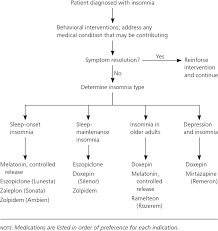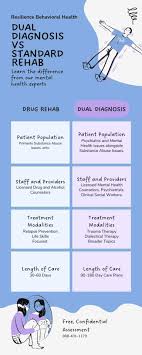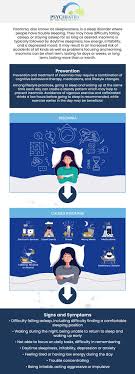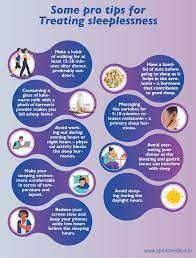Treatment for Insomnia in Adults
Insomnia, the inability to fall asleep or stay asleep, is a common sleep disorder that can have a significant impact on a person’s quality of life. Fortunately, there are various effective treatment options available for adults struggling with insomnia.
Cognitive Behavioral Therapy for Insomnia (CBT-I)
CBT-I is a structured program that helps individuals identify and replace thoughts and behaviors that cause or worsen sleep problems. It focuses on improving sleep habits and addressing the underlying causes of insomnia.
Relaxation Techniques
Practicing relaxation techniques such as deep breathing, progressive muscle relaxation, meditation, or yoga can help calm the mind and body before bedtime, making it easier to fall asleep.
Sleep Hygiene Practices
Establishing good sleep hygiene practices such as maintaining a consistent sleep schedule, creating a relaxing bedtime routine, optimizing your sleep environment, and avoiding stimulants like caffeine and electronics before bed can promote better sleep.
Medications
In some cases, healthcare providers may prescribe medications to help manage insomnia symptoms. These medications should be used under the guidance of a healthcare professional due to potential side effects and risks of dependency.
Addressing Underlying Health Conditions
If insomnia is caused by an underlying health condition such as depression, anxiety, or chronic pain, treating the root cause can often improve sleep quality. Seeking medical advice to address these conditions is essential.
Alternative Therapies
Some adults find relief from insomnia through alternative therapies like acupuncture, herbal supplements, or aromatherapy. While these approaches may not work for everyone, they can be worth exploring under the guidance of a qualified practitioner.
If you are struggling with insomnia as an adult, it’s important to consult with a healthcare provider to determine the most suitable treatment approach for your individual needs. By addressing insomnia effectively, you can improve your overall health and well-being by getting the restorative sleep your body needs.
7 Effective Tips for Treating Insomnia in Adults
- Establish a regular sleep schedule by going to bed and waking up at the same time every day, even on weekends.
- Create a relaxing bedtime routine to signal your body that it’s time to wind down, such as reading a book or taking a warm bath.
- Make sure your sleep environment is conducive to rest by keeping it dark, quiet, and cool.
- Limit exposure to screens before bedtime as the blue light can interfere with your ability to fall asleep.
- Avoid caffeine, nicotine, and heavy meals close to bedtime as they can disrupt your sleep patterns.
- Engage in regular physical activity during the day but avoid vigorous exercise close to bedtime.
- Consider relaxation techniques such as deep breathing exercises or meditation to help calm your mind before sleep.
Establish a regular sleep schedule by going to bed and waking up at the same time every day, even on weekends.
Establishing a regular sleep schedule is a crucial tip for treating insomnia in adults. By going to bed and waking up at the same time every day, including weekends, you can regulate your body’s internal clock and improve your overall sleep quality. Consistency in your sleep routine helps synchronize your natural sleep-wake cycle, making it easier to fall asleep and wake up feeling refreshed. This simple yet effective practice can have a significant impact on managing insomnia symptoms and promoting better restorative sleep.
Create a relaxing bedtime routine to signal your body that it’s time to wind down, such as reading a book or taking a warm bath.
Creating a relaxing bedtime routine can be a powerful tool in treating insomnia in adults. By engaging in calming activities like reading a book or taking a warm bath before bed, you signal to your body that it’s time to wind down and prepare for sleep. These soothing rituals not only help relax your mind and body but also establish a consistent signal to your brain that it’s time to transition into restful sleep, promoting better sleep quality and overall well-being.
Make sure your sleep environment is conducive to rest by keeping it dark, quiet, and cool.
Creating a sleep-conducive environment is essential for adults struggling with insomnia. Ensuring that your bedroom is dark, quiet, and cool can significantly enhance your ability to fall and stay asleep. Darkness promotes the production of melatonin, the hormone responsible for regulating sleep-wake cycles, while a quiet environment minimizes disturbances that can disrupt sleep. Additionally, keeping the room cool can help lower your body temperature, signaling to your body that it’s time to rest. By optimizing your sleep environment in these ways, you can improve your chances of achieving a restful night’s sleep and effectively manage insomnia symptoms.
Limit exposure to screens before bedtime as the blue light can interfere with your ability to fall asleep.
Limiting exposure to screens before bedtime is a crucial tip for adults struggling with insomnia. The blue light emitted by screens can disrupt the body’s natural sleep-wake cycle, making it harder to fall asleep. By avoiding screens such as smartphones, tablets, and computers at least an hour before bedtime, individuals can help signal to their bodies that it’s time to wind down and prepare for rest. This simple adjustment can contribute to better sleep quality and overall well-being for those experiencing difficulties with insomnia.
Avoid caffeine, nicotine, and heavy meals close to bedtime as they can disrupt your sleep patterns.
Avoiding caffeine, nicotine, and heavy meals close to bedtime is crucial in managing insomnia in adults. These substances can disrupt sleep patterns by stimulating the brain and digestive system, making it harder to fall asleep and stay asleep throughout the night. By eliminating or reducing consumption of caffeine, nicotine, and heavy meals before bedtime, individuals can create a more conducive environment for restful sleep and improve their overall sleep quality.
Engage in regular physical activity during the day but avoid vigorous exercise close to bedtime.
Engaging in regular physical activity during the day can be a beneficial strategy for managing insomnia in adults. However, it is important to avoid vigorous exercise close to bedtime. While exercise can help promote better sleep by reducing stress and promoting relaxation, intense physical activity too close to bedtime can stimulate the body and mind, making it harder to fall asleep. By incorporating moderate exercise earlier in the day, individuals can reap the sleep-enhancing benefits of physical activity without disrupting their ability to unwind and prepare for a restful night’s sleep.
Consider relaxation techniques such as deep breathing exercises or meditation to help calm your mind before sleep.
Consider incorporating relaxation techniques such as deep breathing exercises or meditation into your bedtime routine to calm your mind before sleep. These practices can help reduce stress and anxiety levels, making it easier to transition into a peaceful state conducive to falling asleep. By engaging in these relaxation techniques regularly, you may find yourself drifting off to sleep more easily and experiencing improved overall sleep quality.





Excellent post! We are linking too thiss geat posat oon oour site.
Keepp uup the grewat writing.
Thank you for your positive feedback on our article about treatment for insomnia in adults. We appreciate your support and are glad to hear that you found the post valuable. If you have any questions or need further information, feel free to reach out. Keep up the great work on your site as well!